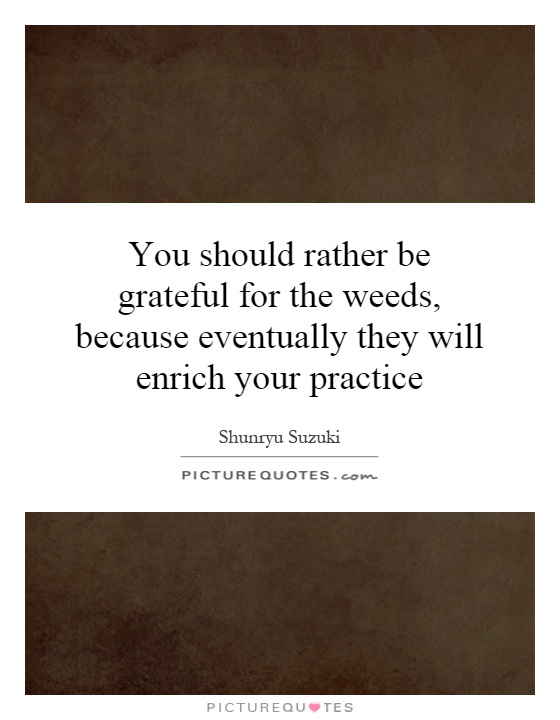You should rather be grateful for the weeds, because eventually they will enrich your practice

You should rather be grateful for the weeds, because eventually they will enrich your practice
Shunryu Suzuki, a renowned Zen master and author of the influential book "Zen Mind, Beginner's Mind," often spoke about the importance of gratitude and acceptance in one's spiritual practice. One of his teachings that resonates deeply with many practitioners is the idea that we should be grateful for the weeds in our lives, as they have the potential to enrich our practice in unexpected ways.In the context of Zen Buddhism, the concept of weeds can be seen as a metaphor for the challenges and obstacles that we encounter on our spiritual journey. These weeds may take the form of difficult emotions, distractions, or external circumstances that seem to hinder our progress. However, Suzuki reminds us that these weeds are not to be rejected or ignored, but rather embraced with gratitude and openness.
Suzuki believed that every experience, no matter how challenging or unpleasant, has the potential to teach us valuable lessons and deepen our understanding of ourselves and the world around us. By approaching these weeds with an attitude of gratitude, we can learn to cultivate patience, resilience, and compassion in the face of adversity.
Furthermore, Suzuki emphasized the importance of seeing the interconnectedness of all things, including the weeds in our lives. Just as weeds can enrich the soil and nourish the plants in a garden, our struggles and difficulties can ultimately contribute to our growth and transformation as spiritual beings.
By embracing the weeds in our lives, we can learn to cultivate a sense of humility and acceptance, recognizing that our imperfections and challenges are an integral part of our spiritual journey. Rather than trying to eradicate or avoid these weeds, we can learn to work with them mindfully and skillfully, using them as opportunities for self-reflection and growth.












 Friendship Quotes
Friendship Quotes Love Quotes
Love Quotes Life Quotes
Life Quotes Funny Quotes
Funny Quotes Motivational Quotes
Motivational Quotes Inspirational Quotes
Inspirational Quotes